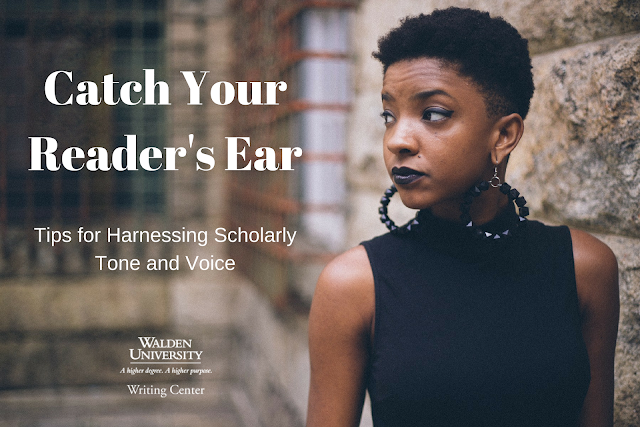Catch Your Reader's Ear: A Five-Part Blog Series on Scholarly Tone and Voice
Note: This post has been updated per APA 7.One of the greatest challenges for scholarly writers is creating compelling, interesting prose that will encourage readers to engage with the writer's ideas. Unlike more informal genres of writing, scholarly prose covers topics, theories, and ideas that require precise, scientific description. Oftentimes, these descriptions are, by necessity, antithetical to the idea of captivating an audience. Plus, the formality valued in scientific research writing means the writer cannot rely on ornamental phrasing or grand spectacles of language to engross the reader.
So what methods do scholarly writers have at their disposal to engage their audience, to catch their reader's ear?
Here at the Walden University Writing Center, our answer to that is writers can write engaging, compelling, interesting prose by harnessing a clear and confident scholarly tone and voice. As writers present their evidence-based research to their readers, there are a number of strategies that can be used to compel readers to engage with their work.
To help writers learn and utilize these strategies, we would like to present a five-part blog series that delves into this topic. Each post in this series will introduce, explain, and put into practice a writing strategy that will help writers harness a scholarly tone and practice using their scholarly voice. We hope these topics will be interesting and helpful to you as you develop your own methods to Catch Your Reader's Ear!
Join us for each part in this series for tips to help you harness your scholarly tone and voice
We hope you will enjoy this blog series and learn from the strategies each Instructor presents. Please let us know in the comments if there are any other scholarly voice-related topics you'd like us to address in future posts.
Until then: Keep writing. Keep inspiring!

The Walden University Writing Center seeks to teach writer's what scholarly writing is, and how to deploy it as a strategic communicative device. Scholarly writing, like all forms of writing, has certain features that are unique to it and that its readers expect to encounter. Once a writer understands and can utilize those features, scholarly writing becomes another tool that can enhance the effectiveness of the writer's expression. This blog series strives to build these skills and understandings.
.png)
Never miss a new post; Opt-out at any time
Subscribe to:
Post Comments
(
Atom
)




when it comes to the audience hearing they should not be rushed through knowing that reader's hearing are not the same and scholarly writers should have empathy and be patient with their reader's participation.
ReplyDeleteAbsolutely. It's so important to consider your reader anytime you write anything. Thanks for sharing your thoughts!
Delete